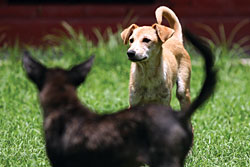 KIRAN PANDAY |
Worst of all, there was a time when the city fathers used to poison the local canine population in order to control the spread of rabies. Lumps of food laced with strychnine used to be strewn about, and the dogs faced a terrible fate as they writhed in pain for hours and even days before they died.
Much of that has changed. Along came an organisation called the Kathmandu Animal Treatment Centre (KAT), which preferred to term the strays 'community dogs'. In Nepali, that would be 'samudayik kukur' instead of 'bhusyaha'.
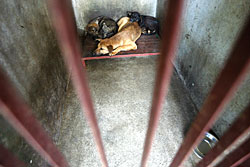 KIRAN PANDAY |
KAT works out of its facility on the road to Budanilkantha, where it has a hostel that temporarily houses dogs. The work program is for KAT teams to go out to the neighbourhoods in the white Maruti dog-catcher van, and bring five to seven dogs back a day. Mostly female community dogs are thus captured.
At KAT, the dogs are vaccinated, de-wormed and sterilised. The canines are then kept as guest for five-six days, and released back to their original neighbourhoods, healthy but sterilised. This is how successful ABC programs have been organised, from Jaipur to Rio, and the program has begun to assume the shape of a success in Kathmandu, thanks to a healthy sense of cooperation between the Kathmandu Municipality and KAT.
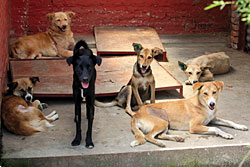 KIRAN PANDAY |
The entertainer Hari Bangsha Acharya is chair of KAT, and his alter-ego Madan Krishna Shrestha is a member. Says Hari Bangsha, "We used to be deeply hurt when we used to see the poisoned animals in such pain, and today feel a sense of satisfaction that KAT has evolved into such an effective organisation."
Anil Rajbhandari is the program officer of KAT. He emphasises that KAT is not a dog pound that houses canines, instead it is a treatment centre which has a link to the neighbourhoods from where the dogs are brought. "We are very happy that we collaborate with the Kathmandu Municipality, because this gives us access as well as continuity to our work," he says.
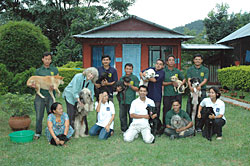 KAT CENTRE |
The result of KAT's work in its area of operation is beginning to be evident. With the decrease in the number of dogs, the locals are being much friendlier towards the canines it has found. A resident of Narayan Gopal Chok, Vinayak Tamang, says he can see the difference. "The number of litters has definitely decreased as the dog population has gone down," he says. "The quality of life of the dogs also seems to be much improved now."
At present, the KAT staff is working overtime with the Kathmandu Municipality and some other organisations as part of the Alliance for Rabies Control Campaign. Over the last three months, they have caught, vaccinated, colour-sprayed (as a marker) and released nearly 2500 dogs. The program was supported by WSPA, which in its website speaks of the 'amazing results' achieved by the KAT Centre of Kathmandu in addressing the matter of community dogs.
In a country where little happens, and where there is loud trumpeting for the little that is done, KAT Centre seems to be an organisation that works quietly - until it is found out.
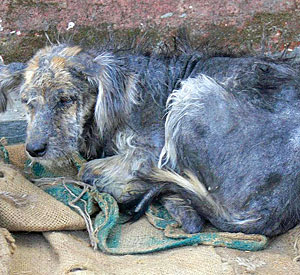 |
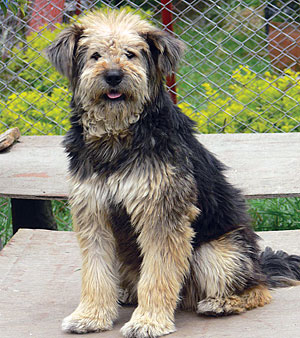 FINALLY HOME: Scrawny Lucy when she was initially found by the KAT centre turns into a stunning beauty after the treatment (top). Malnourished and mangy Mango when she was first captured by the KAT centre, bathing during recovery and finally a plump and healthy dog after the complete treatment (bottom). |
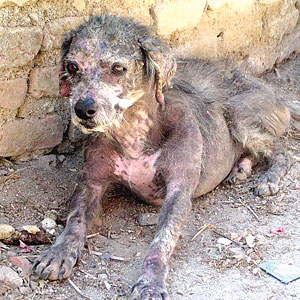 |
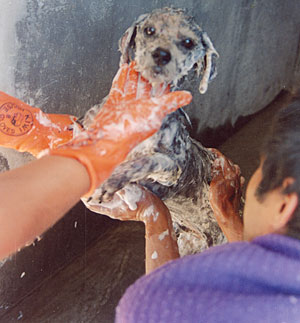 |
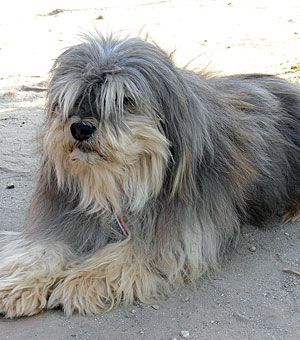 |
Dogs for adoption:
 KIRAN PANDAY |
Age: 3 years
Sex: female
Contact: Bal Krishna Bhujel, 9841241040
Name: Thamel
Age: 2 years
Sex: male
Contact: KAT Centre, 4373169
Name: Kelly
Age: 5 months
Sex: female
Contact: Bal Krishna Bhujel, 9841241040
Name: Khairi
Age: 4 and half months
Sex: female
Contact: KAT Centre, 4373169
Name: Nani
Age: 1 and half years
Sex: female
Contact: Bal Krishna Bhujel, 9841241040
Name: Pangre
Age: 3 and half months
Sex: female
Contact: KAT Centre, 4373169
Name: Kale
Age: 3 months
Sex: female
Contact: Bal Krishna Bhujel, 9841241040
Name: Sango
Age: 4 years
Sex: male
Contact: KAT Centre, 4373169
Name: Chirke
Age: 2 and half years
Sex: male
Contact: Bal Krishna Bhujel, 9841241040
Name: Chiple Kale
Age: 4 years
Sex: male
Contact: KAT Centre, 4373169


